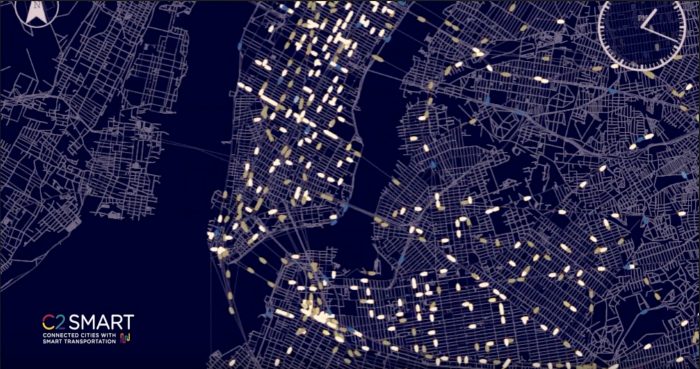Development of an Open Source Multi-Agent Virtual Simulation Test Bed for Evaluating Emerging Transportation Technologies and Policies
Principal Investigator: Joseph Chow
The Need for a Novel Open-Source Transportation Model
Transportation modeling requires substantial transportation data and time-consuming effort for operation and transportation management and policy decision analysis. Large-scale transportation model development is based on various transportation data include traffic volume, bicycle volume, pedestrian volume, signal timings plan, geometry, crash data, travel times and speeds. More importantly, emerging transportation alternatives and technologies, such as connected and autonomous vehicles, electric vehicles, and ride sharing, cannot be readily modeled using existing commercial software tools. In fact, the unprecedented growth of the transportation sector introduces new challenges that make it infeasible to depend on proprietary simulation tools.
Thus, there is a need for an open-source large-scale microscopic transportation model that will cover all New York City (NYC) area, and will eventually be as large as the NYMTC (New York Metropolitan Transportation Council) New York Best Practice Model. Although NYMTC’s NYBPM predicts changes in future travel patterns in response to changes in the demographic profiles and transportation systems in the region, it is limitated in not only modeling daily dynamic recurring and non-recurring congestion and operation, but also developing more detailed transportation control and aiding in planning policy decisions.
In addition, databases currently available in the New York City public sector have not coherently provided dynamic summary and information for a practical transportation planning, control and policy application. Therefore, it is critical to explore additional city-wide large-scale transportation activity models using easily accessible open-source data and programs to support time-sensitive planning, operational control and policy implementation in NYC.
Research Objectives
The main objective of this project is to develop a large-scale, open-source, agent-based model of the study are in NYC using MATSim, an activity-based, extendable, multi-agent simulation framework implemented in Java, and calibrate it based on public sector data from the New York metropolitan area. These data include household travel survey and BPM update data from NYMTC, LION (Linear Integrated Ordered Network) GIS data from NYCDCP, TIMS (Traffic Information Management System) and the MIM (Midtown in Motion) real time data from NYCDOT, and transit schedules from GTFS (General Transit Feed Specification) data from MTA NYCT (Metropolitan Transportation Authority New York City Transit). The researchers will also incorporate other emerging data sources like NYC TLC taxi data, social media data from different sources and other emerging partner companies that collect probe vehicle data at an unprecedented rate.
This data-driven approach to validate and calibrate the proposed agent-based model will be one of the first attempts to develop a highly dynamic simulation tool that incorporates big data into microscopic simulation.
In addition, the research team will select one sub-area in lower Manhattan and downtown Brooklyn to develop using an open-source microscopic traffic simulation framework (i.e., SUMO (Simulation of Urban MObility). SUMO allows microscopic modeling of intermodal traffic systems including road vehicles, public transport and pedestrians.
Deliverables
- A calibrated base scenario MATSIM model
- A calibrated SUMO model for a subarea in lower Manhattan
- A well-designed approach for integrating MATSIM and SUMO
- System design document and guidelines for developing for virtual test bed
- Final report
Development and Tech Transfer of Multi-agent Virtual Simulation Testbed Ecosystem
Objectives
Building on the development of the testbed in previous years, this project will further enhance its applicability and aim to transfer knowledge for using the testbed to local agencies and other members of the C2SMART consortium. The objectives for this phase include:
Application Enhancements
- Use of direct extensions using the base model, such as automated and connected taxis and dockless bikeshare. Different deployment scenarios will be evaluated to provide decision support capabilities to transportation agencies
- Develop a new integrated web-based data analytics toolbox to allow researchers to analyze extensive output of MATSim
- Modification of traffic flow model in MATSim to improve consistency with SUMO and connected vehicle technology in a new model instance
- Test and implement multimodal travel capability using the R5 routing engine adopted by BEAM for a new model instance
Technology Transfer
- Publish a web interface for the virtual testbed
- Open a beta testing period and invite participants from local agencies to evaluate and provide feedback
- Host webinars to share lessons learned in procedures for developing MATSim models and integrating with SUMO with students and PIs at consortium member universities, which will support the expansion of the testbed to other cities
Deliverables
- Simulated scenarios of automated and connected taxi and dockless bikeshare using base model
- Alternative base model with updated traffic flow model with connected vehicle penetration rate
- Alternative base model with multimodal routing
- Ecosystem web interface
- Lesson plans for NYC DOT staff
Phase 1
| Principal Investigator | Joseph Chow, NYU |
| Funding Source | C2SMART Center: $81,999 NYU (cost-share): $47,198 |
| Total Project Cost | $135,799 |
| USDOT Award # | 69A3551747124 |
| Start and End Dates | 03/01/2019-02/28/2020 |
| Implementation of Research Outcomes | The research will produce simulation outcomes for several scenarios of interest to DOT and include activities that make the test bed accessible to policymakers and consortium partners. |
| Impacts/Benefits of Implementation | The research will provide resources and a virtual framework for supporting and helping public sector’s decision making to fill in the gap between basic research and field deployment. Subsequent implementations of the test bed in other cities will form the basis for a “Network of Living Labs” that NYC DOT and other local agencies can benefit from shared knowledge transfer. |
Phase 2
| Principal Investigator | Joseph Chow, New York University |
| Funding Source | C2SMART Center: $108,028 NYU (cost-sharing): $77,670 |
| Total Project Cost | $185,698 |
| USDOT Award # | 69A3551747124 |
| Start and End Dates | 05/01/2018-05/31/2020 |
| Implementation of Research Outcomes | The research will produce a large scale simulation test bed that can be used to evaluate new technologies and policies on transportation systems produced in the research phase for NYC Open Data and other government databases. The cyber test bed will be housed at NYU and be available for NYC government agencies including NYC Mayor’s Office of Data Analytics (MODA) and the Department of Information Technology and Telecommunications (DoITT), Department of Transportation (DOT) and Department of City Planning (DCP) upon requests and coordination. |
| Impacts/Benefits of Implementation | The research will provide resources and a virtual framework for supporting public sector decision making by filling in the gap between basic research and field deployment. Subsequent implementations of the test bed in other cities will form the basis for a “Network of Living Labs” that NYC DOT and other local agencies can benefit from. |








